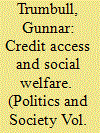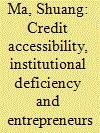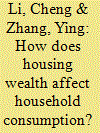|
|
|
Sort Order |
|
|
|
Items / Page
|
|
|
|
|
|
|
| Srl | Item |
| 1 |
ID:
110868


|
|
|
|
|
| Publication |
2012.
|
| Summary/Abstract |
Research into the causes of the 2008 financial crisis has drawn attention to a link between growing income inequality in the United States and high household indebtedness. Most accounts trace the U.S. idea of credit-as-welfare to the period of wage stagnation and welfare retrenchment that began in the early 1970s. Using France as a comparison case, I argue that the link between credit and welfare was not unique to the United States. Indeed, U.S. charitable lending institutions that emerged at the beginning of the twentieth century were modeled in part on older French financial institutions. Three historical factors drove U.S. lenders and policymakers to push for expanded credit access for the working class. First, welfare reformers in the interwar period embraced private credit as an alternative to an expansive welfare state. Second, U.S. organized labor in the wake of World War II embraced credit access as a means to sustain industrial employment and finance strike actions. Third, commercial banks in the 1950s began offering revolving credit accounts as a means to attract new depositors at a time when banking regulation restricted the interest they could offer on deposits.
|
|
|
|
|
|
|
|
|
|
|
|
|
|
|
|
| 2 |
ID:
170093


|
|
|
|
|
| Summary/Abstract |
Using a brand new data, we document seriously low credit accessibility from financial institutes for small and micro enterprises (SMEs) and examine whether and how it affects entrepreneurial activity in China. We find that credit constraints significantly decrease the possibility of households becoming entrepreneurs. Based on our estimates, 10% decrease in the probability of being credit constrained would be associated with 4.3 million newly-created household businesses, or equivalently 11 million jobs. In the end, factors that determine credit accessibility are exploited and the result indicates that institutional deficiency plays a role in shaping the pattern of financing difficulties in China. Specifically, we find households in regions with more commercialized banking or those with government-sector workers are more likely to access to credit when other relevant variables are conditioned. In particular, the positive role of government-sector workers is more pronounced in regions with weaker market institutions.
|
|
|
|
|
|
|
|
|
|
|
|
|
|
|
|
| 3 |
ID:
182805


|
|
|
|
|
| Summary/Abstract |
Thanks to four-decade spectacular economic growth, China's households have been accumulating a stockpile of wealth. In such a context, further concerns have been raised about the relationship between wealth accumulation and improvement of economic well-being, mainly through consumption. The issue becomes even more important when considering the challenges facing China in recent years, which can be characterized by a mix of increasingly leveraged households, escalating housing price, sluggish consumption, slowing economic expansion, trade frictions with the United States, and the Covid-19 pandemic and resulting economic difficulties. With that background in mind, this paper first provides international evidence on the relationship between household consumption and wealth, especially in the form of houses. Drawing on a panel of aggregate data for fourteen countries including China, we find that household consumption positively responds to changes in housing wealth, and this link is further affected by different levels of government spending and financial development. We next relate the international evidence to the case of China, with the focus on some recent policy issues over housing regulations and consumption promotion. Importantly, as the evidence and underlying theories suggest, housing wealth-consumption association does not follow a simplistic pattern, and thus, multiple policy measures could and should be undertaken rather than merely curbing speculative activities in real estate exchanges and associated financial business.
|
|
|
|
|
|
|
|
|
|
|
|
|
|
|
|
|
|
|
|
|